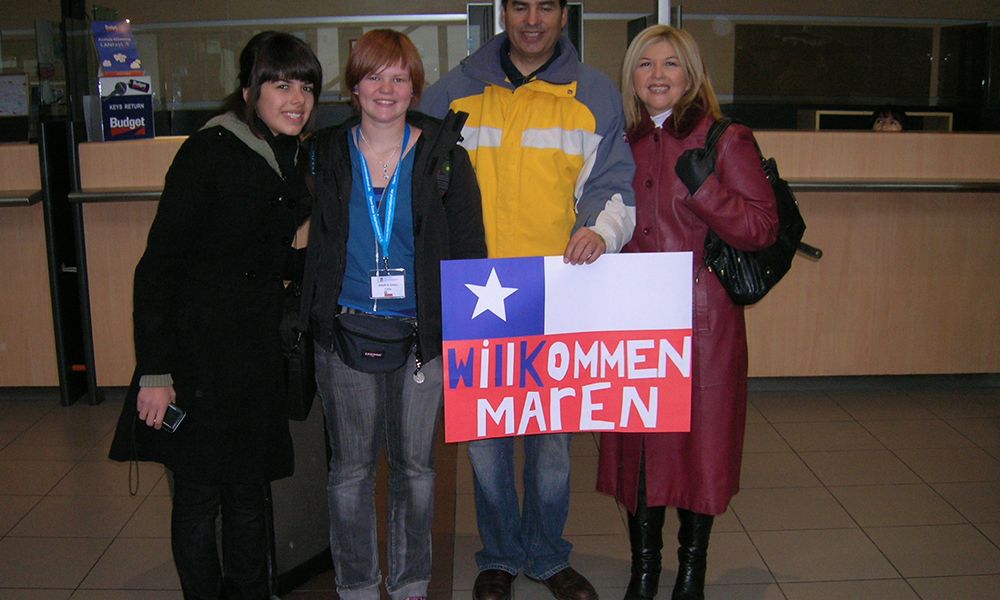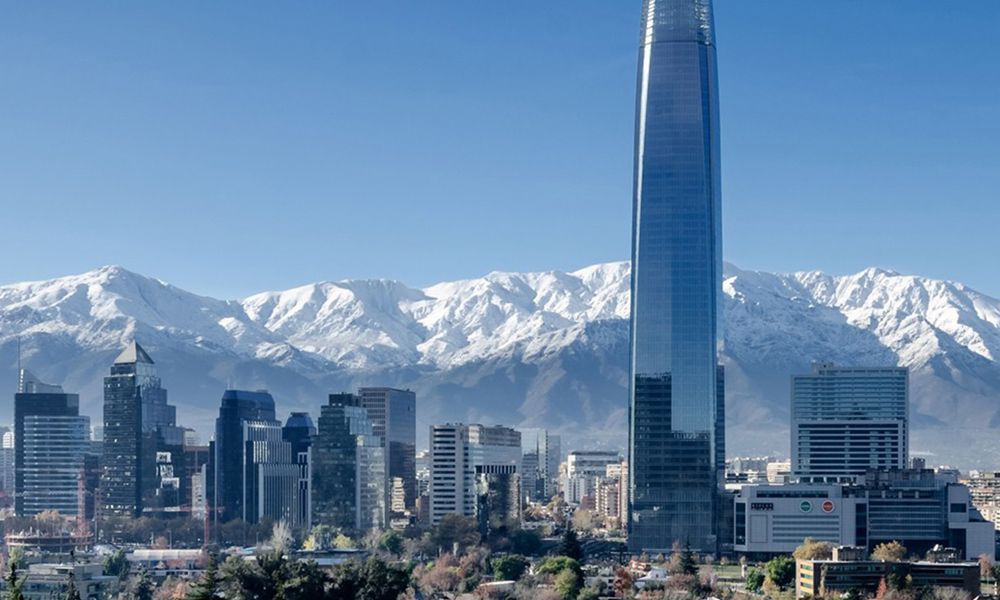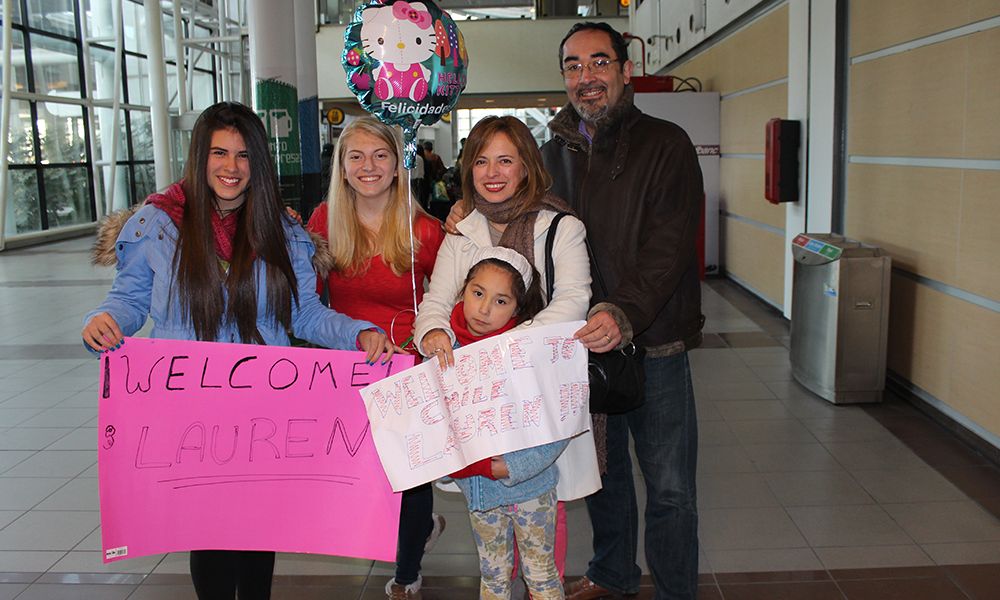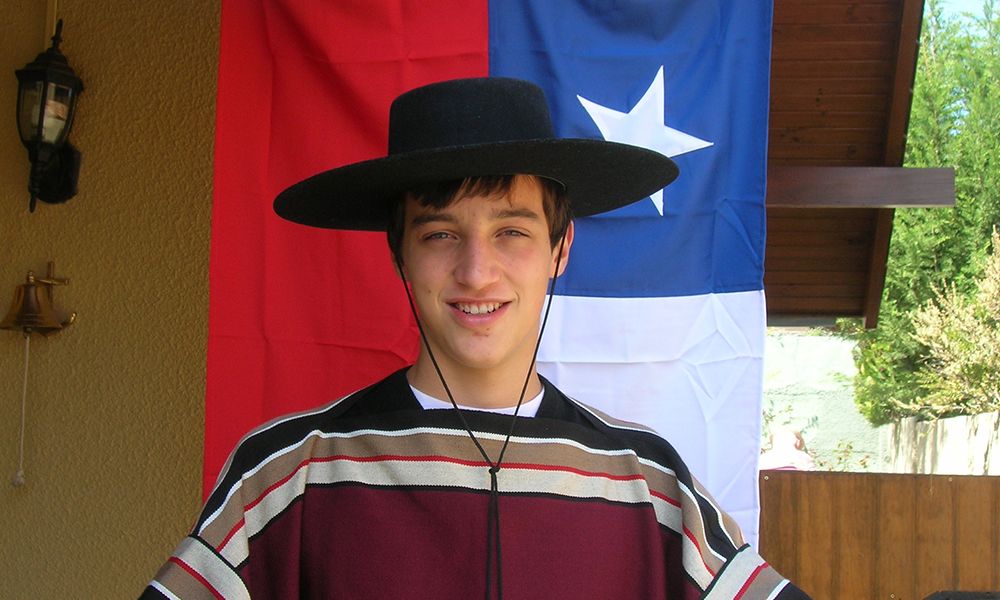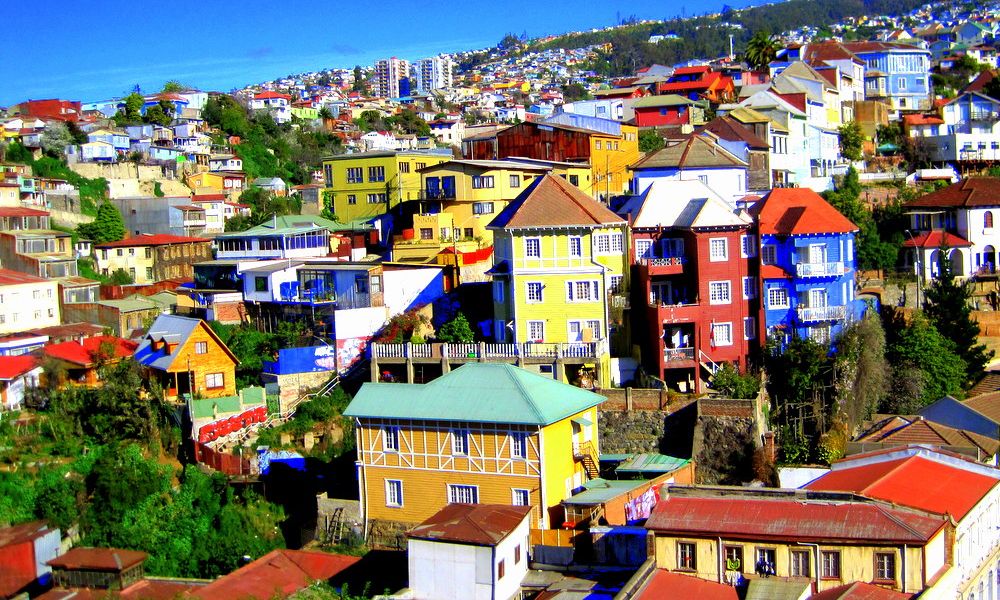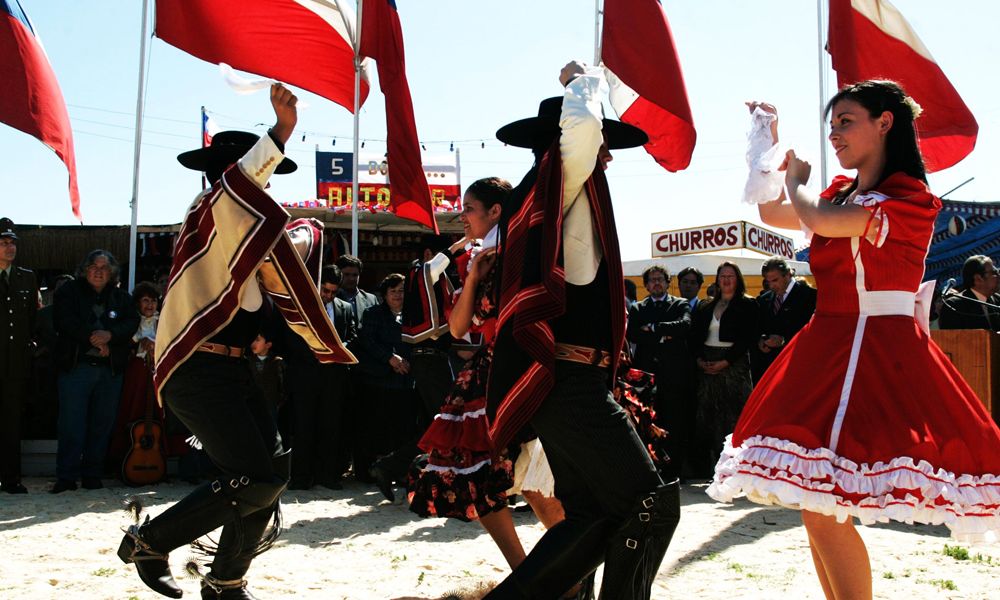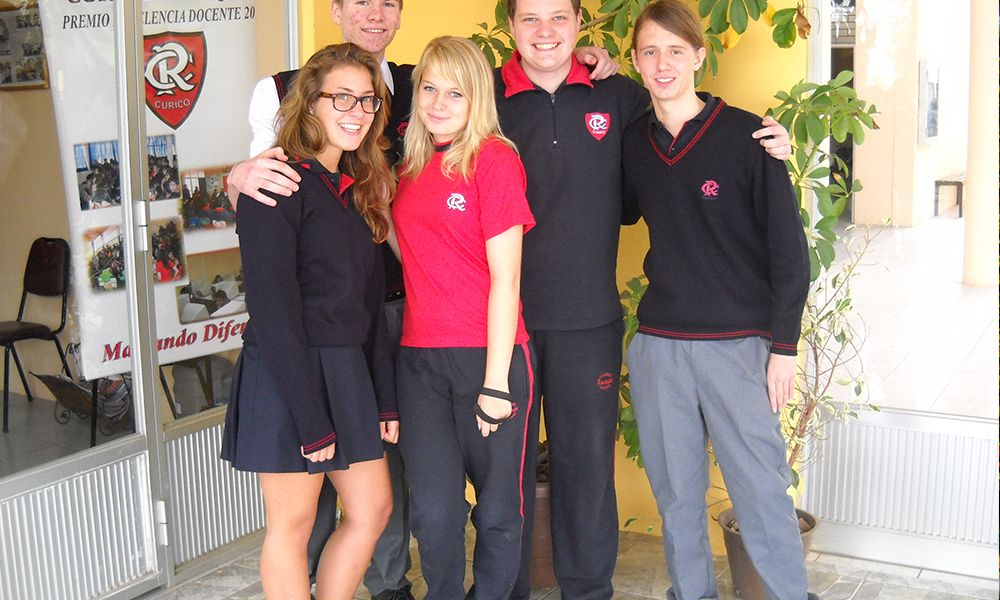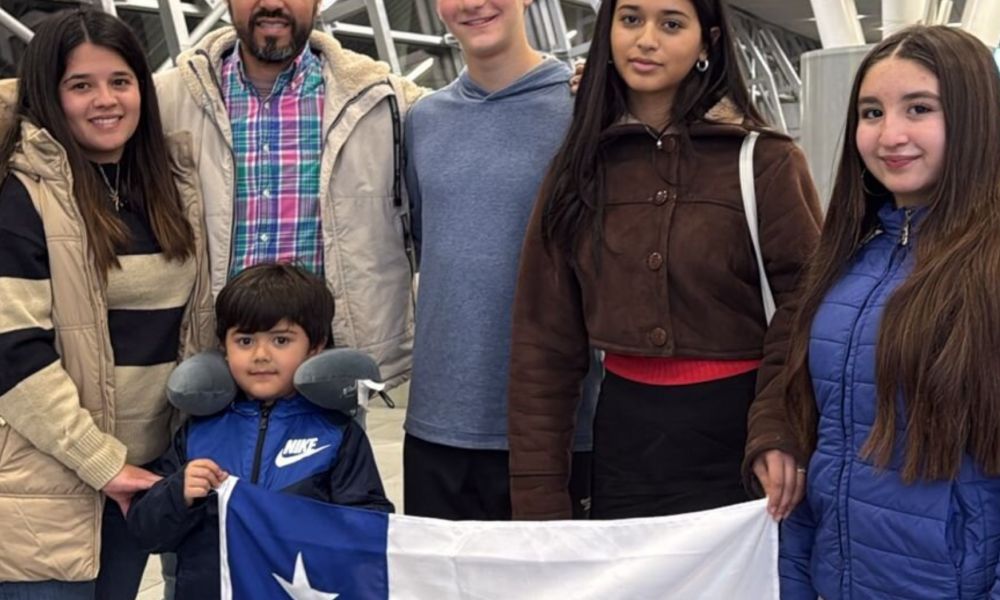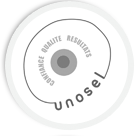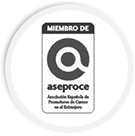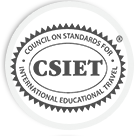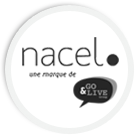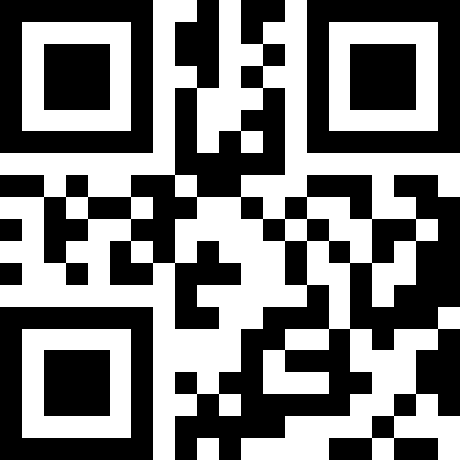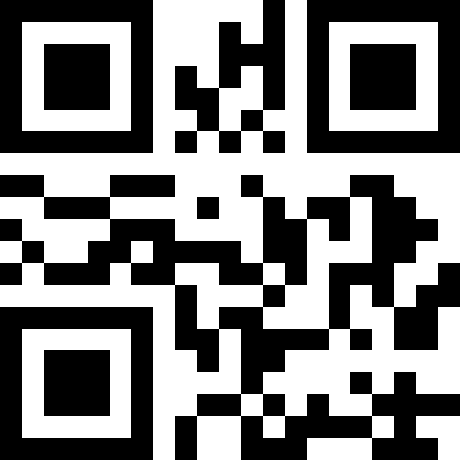Improve your Spanish speaking skills becoming an exchange student in Chile.
Study abroad in Chile for a term, semester or school year and live with a Chilean host family. Broaden your mind, living in South America and attending High school. You will meet new friendly and warm people!
Explore Spanish in Chile now, choose a High School Study Abroad in Chile.
Next possible start dates: July 2026. Apply now!
Student Exchange in Chile: Study in a local high school and live with a Chilean host family
Nacel's student exchange programs in Chile offer you the unique opportunity to live with a Chilean family and study at a local high school. Like just another Chilean teen!
Exchange students will enjoy the Latin American spirit of the Chilean culture. European influence is clearly felt in Chilean art, architecture and music. The geography of Chile is perhaps the most impressive: the country extends some 4300 km from the desert north to the glacial south. As a result, exchange students will discover a huge variety of landscapes and weather conditions.
What should I expect from this High school exchange in Chile?
- You can study one trimester, a semester, and up to a complete academic year at a Chilean High school.
- You will live with Chilean host families who will welcome you as a new family member.
- As soon as you arrive in the country, you will attend an orientation session with your local coordinator who will provide you assistance and support throughout your program. We will keep your parents informed of your adventures in the country.
Your High School in Chile
General basic education is compulsory and lasts for eight years, divided into two cycles of 4 years each. Secondary education (Educación media) lasts for four years. Around 13 to 15 different subjects are offered during each school year, such as:
- Spanish,
- Math,
- Economics,
- English,
- Biology,
- Physics,
- Chemistry,
- Government,
- Philosophy,
- Sports,
- Algebra, etc.
Grades 9 and 10 are standardized. From Grade 11 though (Tercero Medio) Chilean students choose to focus more on sciences or humanities. In this case they focus on:
- either Maths / Physics / Biology / Chemistry
- or Literature / Philosophy / History.
A uniform is usually required in Chilean high schools.
Study Abroad in Chile
Exchange students are placed in selected private high schools. The average size of schools varies from 400 to 1,200 students; schools include all levels (1st to 12th grade).
Schools starts at 8 or 8.30am and end between 4 and 6 pm, with one lunch dedicated to lunch break. School usually takes place form Monday to Friday (sometimes Saturday).
Adds on:
You will eventually have the opportunity to travel to Easter Island or to the North of Chile once within a six-month period. Don't miss this opportunity!
Graduation is not possible during your experience during your High School exchange in Chile.
Your Exchange Program Duration
Trimester: Students can stay for one trimester starting in March, May, July, and September (consult with us about exact dates).
Semester:
- March 1, 2026 to July 5, 2026
- July 4, 2026 to December 5, 2026
Academic year: March 1, 2026, to December 5, 2026
Visa information: Information regarding visas is provided after acceptance into the program. To learn more, visit the Embassy of Chile website.
Sign up for this authentic exchange program in Chile with Nacel!
We also offer various other destinations for your Spanish-speaking High School Abroad:
Teenage life in Chile includes extracurricular activities that Chilean students attend at school or in local clubs. At school, students usually attend two extracurricular activities, like sports, music, arts, etc. The offer depends on schools.
We encourage you to sign up for extracurricular activities: you make new friends, practice Spanish in a different environment than the classroom, stay fit and busy, and build strong relationships with teens from different backgrounds. This is an additional value to your exchange program in Chile.
During your High School Study Abroad in Chile, you live with a volunteer host family, who provide all meals taken home (breakfast, lunch, and dinner).
Your journey starts by meeting at the airport in Santiago, your Chilean host family who opens their home and heart to you. In addition to providing you with Room and board, your Chilean host family introduces you to the family culture and Chilean life, and they are your passport to this immersive Chilean adventure!
They are your family away from home and guide you throughout the experience with the support of your local coordinator!
You create memories of a lifetime and build a strong relationship with your Chilean family for the rest of your life.
Travel & Orientation
Once you land in Chile, you are warmly welcomed by your host family and your local coordinator. Your local coordinator remains in touch with you throughout your stay in Chile and is a support worker: you can rely on this staff to help you at any time during your exchange in Chile. Your local coordinator will conduct an orientation so that you can settle into your new life and start this adventure with all the necessary information and tips!
High School exchange in Chile
* Price in Euros per participant.
Not included : Application Fees (65 EUR)
High School Abroad in Chile:
- Semester Abroad Chile
- School Year Abroad Chile
- High School Summer Abroad Chile
💰 What's Included in the Price?
- 20+ years of experience providing high-quality study-abroad programs
- Processing of student applications
- Host family accommodation with full board
- Airport pickup and transfer from Santiago de Chile to the host family after orientation at the airport, by unaccompanied bus transfer if the host family does not live far away from Santiago (please note that students may have to pay an additional transfer by flight if they are placed far away from Santiago; for arrivals and departures outside of official dates/hours, an extra fee is charged)
- Orientation on arrival by the local coordinator at the airport
- Local health, accident and private liability insurance
- Necessary documentation for the student to obtain a student visa for Chile and visa guidance
- Support, assistance, and 24/7 Hotline
- Regular Progress Feedback
- Access to an in-country support team, and Nacel Student Support staff
🚫 What's Not Included?
- Round-trip international airfare
- Non compulsory insurances (luggage lost, flight delay etc.)
- Visa, passport and medical exam fees
- Extra activities organized by schools and others
- Extra language courses
- Local transport (to and from school for example)
- Extension fee (800 euros), late application fee (570 euros)
- School uniform (around 160 Euros) and shoes, school lunches (around 3 Euros /day), school books (around 150 Euros) and material
- Personal expenses and spending money
- Liability and Emergency Repatriation Insurance
For this High School Abroad in Chile, you:
- must be between 14 to 18 years old.
- need to be interviewed by our counselor before being accepted for a High School Program in Chile.
- need to have a minimum of one to two years of Spanish study (either in a face-to-face language class or online).
- need to have good grades at school.
If your Spanish level is rather low, we advise you to attend a local 2-week Spanish Language Course on arrival.
Frequently Asked Questions
~~~~~~~~~~
There are a few tips that will help your child feeling confident and secured abroad. Here are some ideas for him/her:
- Self-learning: try to learn usual expressions you may have to use in your daily life, do thematic wordlists (food, entertainment, clothes…).
- Try to read a book or see a movie in original version, with subtitles in the language too: this is a good training to improve your hearing skills and this will prepare you to your life abroad.
- Collect information about the country or area you will be living in: How is the climate there?
What activities can be done? Are there places to visit? If you are doing a Tour, check the different places you will go to! These tips will leave you with many ideas of outside-of-the-classroom activities and help you to plan your trip so you won’t miss a visit!
We believe that the success of a stay abroad largely depends on the quality of the host family. Our local coordinators carefully select and visit prospective host families.
Our host families are:
- Warm, welcoming & open minded,
- Proud to share their lifestyle & language,
- Willing to include an exchange student in their family & community,
- Aware that today's youth need to be world citizens.
Sometimes student are hosted in an individual room, sometimes in shared rooms. It depends on the destination and program. However, students of different sex won’t share a room.
Generally speaking, there won’t be more than 4 years of difference between two children sharing the same room. In all programs, host families have no duty to organize activities for the student (students must being their own spending money). Students must be mature enough to get occupied by themselves.
Here are some tips for you:
1) Communicate! Please talk about everything and be open with your host family. For example, tell them about your school life, where you are going, and what time you will return. Make a point to discuss host family rules, and schedules (such as when you can take a bath) right away.
2) Ask Questions. When in doubt, ask your host family for help. You might not understand everything at first, but your host family wants to help. You might feel less independent in the beginning, but these feelings will go away eventually. Don’t hesitate, or feel it is impolite to ask many questions. This is normal.
3) Discuss Issues. Sometimes there will be small problems adjusting for you and your host family. It is important to talk about these frustrations even if they seem small. Always talk to your host family first about any problems. If you become sick, tell your host family right away.
4) Allow adjustment time. You may form an image of your host family within the first couple of days that isn’t accurate. Your host family might take you sightseeing, fix special foods, or be extra polite when you first arrive. Little by little, you and your host family will feel more comfortable around each other and act naturally.
5) Participate in Family Life. Don’t hide in your room. If you are feeling homesick, hiding in your room will only make it worse. Have fun with your host family, and share in evening or weekend activities.
6) Keep an Open Mind. Look at differences as new and fun experiences. This is your chance to try many new things that you might not be able to do in your home country. Take advantage of the opportunity!
7) Be polite and friendly. This is important. You might not talk very much with your family in your home country, but if you shut yourself off from your host family they will assume that you are homesick or unhappy. When you like something, be sure you tell them. A “thank you” and a smile can go a long way!
8) Help with Housework and Chores. Seriously, you would be surprised at how much an offer to do the dishes will mean to your host family.
Remember, your host family will also be nervous, especially if it is their first time hosting. They worry about whether you like the food or their family. If you are open and friendly, you will help to put them at ease. At the end of your stay, you will probably find that you do not want to leave!
The benefits of studying abroad are multiple.
Here are some that you may want to consider:
- Develop and improve new language skills.
- Immerse yourself in a new culture and way of living.
- Become more independent.
- Gain a new perspective of your country, the destination country and the world while appreciating diversity.
- Find a family, make new friends and establish international friendships that could last a lifetime.
Most certainly! Among the purposes of our programs are acquiring cultural understanding and making new friends. One of the paths to obtain them is via extracurricular activities.
It's possible that your high school may not offer programs related to your interests or hobbies. However, this shouldn't be a problem as your host town will likely have various clubs, community facilities, and sports centers where you can continue to develop your skills and make lasting friendships.
Once your placement is confirmed, you can start getting to know your host family right away!
Feel free to use any communication channel that works best for you, whether email, phone calls or video calls.
There are a few tips that will help your child feel confident and secure abroad. Here are some ideas for him/her:
- Research takes time to research the destination´s culture, geography, and climate. In addition, once you have been assigned a host family, we also suggest communicating with them to get to know them, start building a relationship, and understand their expectations.
- Self-learning: try to learn the usual expressions you may have to use in your daily life, and do thematic wordlists (food, entertainment, clothes…).
- Try to read a book or see a movie in the original version, with subtitles in the language too: this is good training to improve your hearing skills and this will prepare you for your life abroad.
What activities can be done? Are there places to visit? If you are doing a Tour, check the different places you will go to! These tips will leave you with many ideas for outside-of-the-classroom activities and help you to plan your trip so you won’t miss a visit!
Usually, students bring a small gift from their home country to their host family but it is not mandatory at all. It should not be a high-value gift but something typical of your country and culture.
If your child plans on taking electronic devices with him/her, you should check if he/she will need an adapter and buy one if he/she does.
A small, two-entry language dictionary may be very useful (must-have!), as well as a travel book of the city/area, with a plan.
Participant must be aware that they are responsible for the handling of their luggage. We advise you to travel with light luggage.
Aside from essential documents (passport and travel information), school supplies, and a photo album from home, we suggest reviewing the local weather for the time your child will spend abroad so he can adapt his clothes and bring what is necessary.
Take your most important belongings with you on board (hand luggage): necessary drugs if you are sick on board or have medical treatment; acceptance letters, passport, visa papers, and insurance certificate, details of your host family and/or of the person who is supposed to pick you up at arrival, emergency phone number for the program, electronic devices like camera and music devices, jewels if any, glasses, etc.
There are several options available for High School exchange programs in Chile:
- Academic Year Program (AYP): March 2 – December 6, 2026.
- Academic Semester Program (ASP):
Semester 1: March 2 – July 6, 2026.
Semester 2: July 5 – December 6, 2026.
- Short-Term Programs (STP): 3 to 12 weeks, from mid-March to early December (no visa required).
Students interested in participating in a High School exchange program in Chile must be between 14 and 18 years old. Individual assessments will consider maturity, attitude, and prior experiences.
They also must have a one-year course and/or basic communication skills in Spanish.
If skills are insufficient, a two-week Spanish course is mandatory.
Every application must be submitted by October 30th for those who wish to start in March, and no later than April 15th for those who wish to start in July.
Yes. Students will receive an orientation upon arrival, either at the airport or at their destination. Follow-up meetings occur within two weeks to address questions.
Yes. Early arrivals are accommodated for €150, covering airport pickup, meals, and lodging.
The program includes tuition, host family (full board), administrative fees, local coordination and support, transportation to/from the Airport, orientation course, and local insurance (health, accident, and private liability insurance)
Parents are advised to give the students around €150 or $200 per month for personal expenses.
Exchange students will attend private Chilean High Schools.
They usually go with their host sibling to the same school, sometimes in the same grade. The schools welcome students from Grades 1 to 12. The average size of schools varies from 400 to 1200 students; schools include all levels (1st to 12th grade).
The school year runs from mid-February to mid-December
Yes. One of the requirements of the program is to have a one-year Spanish course or have basic communication skills in Spanish.
Since Spanish is the main language in Chile, students are expected to use it at all times and therefore, improve their Spanish skills significantly.
Chilean families may have different meal patterns, transportation habits, and holiday traditions. Adaptability is crucial.
Coverage includes health, accident, liability, and COVID-19 assistance.
Students attending a High School exchange program are expected to follow the host family and school rules and attend school daily.
They are not allowed to drive, smoke, drink alcohol, or use drugs during the time he/she participates in the exchange program.
The student will be helped by our local representative and his/her host family to visit a local doctor and get the necessary medical treatment. If hospitalization, surgery, or repatriation is needed, the insurance should be first informed.
If necessary, our team at the headquarters located in France, which delivers a 24-hour emergency service, 365 days a year, may assist you. The phone number of this service will be given to you before the student’s departure.
Please be sure to have a medical insurance. We can provide you with one, for an additional cost. Ask us for more information about the insurance policy!
Your child’s trip abroad will be a rewarding experience, but he/she has to be ready to change his/her way of life for some time and toadapt to the host family.
Here aresome tips to check if your child is ready for this challenge:
- He/She is the one who wants to participate in thestudy abroad program. Never force your child to go abroad if he/she doesn’t want to! At best he/she won’t enjoy his/her trip as much as if he/she would have decided him/herself. At worst he/she will be repelled by his/her language studies back home!
- He/She showsinterest and curiosity about the language or the countryhe/she is going to visit.
- He/She isindependent enoughto be able to cope with problems that may occur (flight delays, loss of luggage, waiting time…), or with homesickness (has he/she already been far away from home? How did he/she cope with that?)
- He/She ismature enough. In some of our programs, supervision is high, and activities are planned all day long. But in others, students are less supervised and must be mature and responsible enough to behave according to the program’s rules and to find occupations.
If you are not sure if your child is ready or not, we can advise you!Meet the teamof Nacel!
Homesickness may happen to everyone, even people who have already been abroad without having faced any problems before. To prevent homesickness, keep in touch with your child, but not too much/too often (see below), and follow our preparation tips. If it is your child’s first experience abroad, a short-term experience would probably be the best choice for you to make, so that your child can “test” himself/herself.
The purpose of most of our programs is the immersion in another country’s language and culture. During the first days, it is normal if your child feels a bit homesick, and too frequent communication with his/her natural parents could delay his/her integration into the host country.
You can suggest she/he get involved in local activities, clubs, and sports to help her/him make friends with similar interests.


